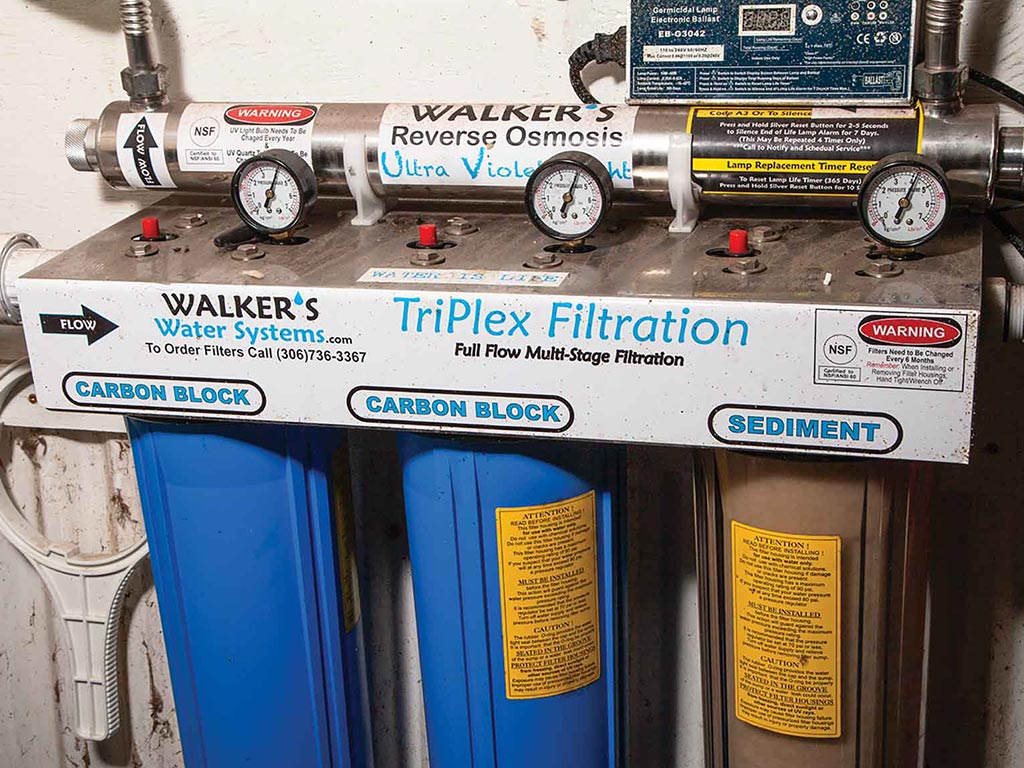Agriculture, Livestock/Poultry March 01, 2024
A Matter of Quality
.
Water management pays big dividends.
Water isn't a luxury, it's a necessity for all farming operations. It's especially critical for dairies and intensive livestock operations. If anything disrupts their water supply they're instantly facing a crisis.
Unfortunately, the water supply has always been precarious in much of the Canadian Prairies. There are few lakes and rivers and while many have high-volume wells, water quality across much of the region could charitably be described as spotty at best.
The vast majority of western Canadian farms depend on either dugout surface water or deep underground wells. Since much of the region sits on a very mineral-rich land base, water from deep wells is typically loaded with minerals, too. Calcium, magnesium, iron, black manganese, nitrates, and sulfates can all be a problem for both people, livestock, and water for spraying.
"Everything's a struggle when you don't have good water in any type of an operation, whether it's an intensive livestock operation, crop production, or just for household use," says Darwin Brown with Walkers Water Systems in Kipling, Saskatchewan. "If you are drawing from a well with a high TDS number [total dissolved solids], loaded with minerals, everything that uses water, from watering bowls to washing machines starts to chunk up. Maintenance is a major issue with problem water. You're constantly fixing and replacing equipment that's getting plugged and clogged up."
Even water with very high TDS levels looks crystal clear when it first comes out of the well. However, it'll start turning a deep rusty red in just a few minutes as the minerals in it start to oxidize. That's why prairie well water is infamous for staining clothes and leaving rings around bathtubs.
Above. Even water with the highest TDS numbers will be crystal clear when it first comes out of the well. But after it's exposed to air for a few minutes it turns rusty brown. Any well water can be brought to acceptable standards. It's just a matter of cost.
Government of Canada guidelines say good water quality for human consumption should have less than 600 mg/L (milligrams per litre) TDS. Anything with more than 1200 mg/L is unacceptable. It's common for Prairie deep well water TDS to fall into the 800 to 1200 mg/L range and some exceed 3000.
Water for livestock is allowed to have a higher TDS. Government of Saskatchewan guidelines say any water with less than 3000 mg/L TDS is suitable for cattle, sheep, and horses. However, the further they rise above this number the more health issues they'll cause for livestock. It'll be an even bigger issue if its sulfate levels are above 500 mg/L.
"The only foolproof way to get rid of them is with a high pressure, commercial-grade, reverse osmosis filter," Brown says. "They work very well, they're relatively low maintenance and at the end of the day you have perfect water. They can be scaled from a small system used to treat one drinking water tap, up to one large enough to meet the maximum daily requirement of a feedlot, poultry operation, or a dairy."
Any well water can be brought to acceptable standards with modern water treatment systems, Brown says. It boils down to cost. A system designed to treat a farm residence's needs will cost between $15,000 and $20,000 (CAD). But if you want one large enough to meet the needs of an intensive livestock operation start adding zeros.
Just because they can cost a lot doesn't mean they aren't economical, Brown says. Households could quickly cover the cost of a residential water treatment system just by not having to replace appliances as often. Systems that are designed to treat water for livestock, or water for spraying operations, quickly can generate a payback through increased animal health, milk production, meat production, and reduced herbicide and fungicide use. ‡
Read More

AGRICULTURE, FARM OPERATION
Starting from Scratch
Finding success with flowers.

AGRICULTURE, EDUCATION
Soil Sisters
Field day aims at women passionate about soil health.



